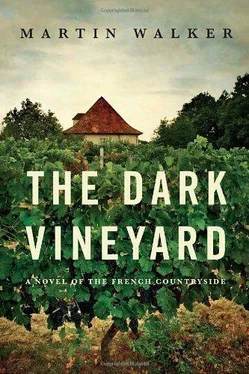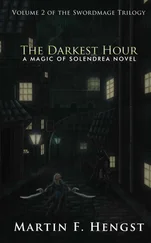Martin Walker - The dark vineyard
Здесь есть возможность читать онлайн «Martin Walker - The dark vineyard» весь текст электронной книги совершенно бесплатно (целиком полную версию без сокращений). В некоторых случаях можно слушать аудио, скачать через торрент в формате fb2 и присутствует краткое содержание. Жанр: Полицейский детектив, на английском языке. Описание произведения, (предисловие) а так же отзывы посетителей доступны на портале библиотеки ЛибКат.
- Название:The dark vineyard
- Автор:
- Жанр:
- Год:неизвестен
- ISBN:нет данных
- Рейтинг книги:5 / 5. Голосов: 1
-
Избранное:Добавить в избранное
- Отзывы:
-
Ваша оценка:
- 100
- 1
- 2
- 3
- 4
- 5
The dark vineyard: краткое содержание, описание и аннотация
Предлагаем к чтению аннотацию, описание, краткое содержание или предисловие (зависит от того, что написал сам автор книги «The dark vineyard»). Если вы не нашли необходимую информацию о книге — напишите в комментариях, мы постараемся отыскать её.
The dark vineyard — читать онлайн бесплатно полную книгу (весь текст) целиком
Ниже представлен текст книги, разбитый по страницам. Система сохранения места последней прочитанной страницы, позволяет с удобством читать онлайн бесплатно книгу «The dark vineyard», без необходимости каждый раз заново искать на чём Вы остановились. Поставьте закладку, и сможете в любой момент перейти на страницу, на которой закончили чтение.
Интервал:
Закладка:
The dark vineyard
Martin Walker
Wine is bottled poetry
. -Robert Louis Stevenson (1850-1894)1
The distant howl of the siren atop the mairie broke the stillness of the French summer night. It was an hour before dawn but Bruno Courreges was already awake, his thoughts churning with memories and regrets about the woman who had until recently shared his bed. For a brief moment he froze, stilled by the eerie sound that carried such a weight of history and alarm. This same siren had summoned his neighbors in the small town of Saint-Denis to war and invasion, to liberation and peace, and it marked the hour of noon each day. Its swooping whine also served to call the town’s volunteer firemen to their duty. Such an emergency invariably required his presence as the sole municipal policeman of Saint-Denis. The brusque summons shook him from his melancholy thoughts, and he thrust aside the tangled sheets.
As Bruno dressed and swigged from a carton of milk by way of breakfast, his cell phone rang. It was Albert, one of the two professionals who led the town’s team of pompiers, and he, his truck and his night patrol were already en route.
“There’s a big fire up on the old road to Saint-Chamassy,” Albert began, an urgency in his voice. “It’s at the top of the hill, just before the turn to Saint-Cyprien. A barn and a big field. This time of year it could spread for miles if the wind gets up.”
“I’ll join you there,” Bruno said, tucking the phone between his shoulder and his ear as he tried to fasten his shirt buttons. He squeezed his eyes shut to draw on the map of the sprawling commune of Saint-Denis that he kept in his head. It was composed of the roads he patrolled, the isolated homes and hamlets he visited, the farms he knew, with their flocks of geese and ducks and pigs and goats that made this the gastronomic heartland of France. His familiarity with the ground over which he hunted, and searched for mushrooms after it rained, meant that he knew his district like a woman knows her own face.
“There’s no report of any casualties,” said Albert. “But you’d better alert the hospital as soon as you’ve told the mayor. I’m calling Les Ezyies and Saint-Cyprien for support. Can you stop at the station and make sure they send up the spare water tankers when the rest of the guys get in? Drive one of the tankers yourself if you have to. We’ll need all the water we can find. I’ll see you at the scene.”
“What about evacuation? There are four or five farms up there.”
“I don’t know yet, but the mayor had better start phoning people to put them on alert. Get a warning out on Radio Perigord.”
Bruno prayed that his elderly and sometimes temperamental van would start right away. He quickly fed his dog, left his chickens to fend for themselves and ran to the vehicle. It started at once, and he drove one-handed down the lane from his cottage toward town, thumbing the auto dial on his phone to alert first the mayor and then the chief doctor, each of whom already had been awoken by the siren. Lights were on inside people’s homes, and the town was stirring as Bruno drove at high speed to the gendarmerie to tell old Jules on the night desk to call the radio station in Perigueux and to dispatch men to seal off the road near the fire. As Bruno hurried back out to his van, Captain Duroc rushed into the main building from the small barracks next door, still pulling on his uniform jacket. Bruno left Jules to explain the situation. At the fire station, Ahmed and Fabien were struggling with the towing rig for the tankers as the other volunteers were arriving, sufficient to man the trucks and tenders. Bruno drove on as fast as his van could manage, his blue light flashing and the town siren still howling into the night behind him.
By the time he reached the open road by the railway line to Sarlat, he could see the broad glow in the hills above. Bruno shivered with apprehension. Fire frightened him. He had always treated it with a wary respect, which had become something close to fear since he’d hauled some wounded French soldiers from a burning armored car during the Balkan Wars. His left arm still carried the scars. In his bedside drawer was the Croix de Guerre the government had awarded him for his efforts, after a lengthy debate among bureaucrats as to whether the Bosnian peacekeeping mission was actually a war.
Bruno wondered if there was anything in the jumble in the back of his van that might serve as protective gear. There would be gloves and a cap in his hunting jacket, his hunting boots and some swimming goggles and a bottle of water in his sports bag. Maybe there was an old tennis shirt he could soak and use as a face mask. He pushed the accelerator harder as the van labored up the hill. He knew this area well but tried in vain to remember where there might be a barn this high up on the plateau, where the land was too poor for farming. It was mainly woods and thin pasture, some tumbledown shepherds’ bories of old stone, plus the tall microwave tower.
As Bruno rounded the last bend before the plateau, the whole night sky ahead seemed to pulse and glow red above the trees. He remembered the dry summer, the river so low that the tourist canoes had to search out the deeper channels. Now he could smell the burning. He slowed down. At least some of the pulsing red was the flashing light of Albert’s fire truck. Bruno parked off the road. He put on his boots, gloves and hunting cap, looked at his swimming goggles and stuffed them into a pocket, poured water on the tennis shirt he had found and ran up the road to the truck, where two pompiers stood bracing the spouting hose, silhouetted against the flames.
“Not a barn, just a big wooden shed. We couldn’t save it,” shouted Albert over the crackling of the flames and the roaring noise of the truck. He reached into the back of the vehicle and pulled out a heavy yellow fireman’s jacket and handed it to Bruno, nodding his approval of the stout boots on Bruno’s feet.
“It could have been a lot worse. We were here in time to stop it from spreading to the woods.”
More pulsing lights began to grow on the road as Ahmed approached with the second fire truck and the big water tanker, and then there were flashes of blue as the gendarmes arrived in their big van. Albert was calling the neighboring fire chiefs to say their help would not be needed.
“No sign of any people?” Bruno asked. Albert shook his head and ran off to direct the second truck. “How did you hear about the fire?” Bruno called after him.
“Anonymous call from the phone booth in Coux,” Albert shouted back.
Bruno made a mental note of that as he tried to get his bearings. He remembered this road being thickly wooded on both sides, but where he stood there was a break in the trees, and a new-looking dirt track curved into the wide stretch of field and pasture that was burning low but steadily. What little breeze he felt on his cheeks was coming toward him and toward the woods, where the pompiers were soaking the brush to deny the flames any fresh fuel. The biggest fire was the ruin of what had been the shed, standing amid the charred crop. Bruno’s foot caught on something. He looked down and saw a small metal flag, like the one farmers used to identify which seeds they had sown in which rows. He plucked it from the ground and, in the light from the truck headlights, read the words AGRICOLAE SECH G71. That meant nothing to him, but he stuffed the flag into his pocket. Shouts came from behind, and he turned to see more yellow-clad pompiers struggling up with a second hose, which bucked in their hands as it filled and a much more powerful jet of water lanced onto the edge of the woods.
“Smell anything funny?” Albert asked, suddenly looming beside him. “Come on, this way.”
Читать дальшеИнтервал:
Закладка:
Похожие книги на «The dark vineyard»
Представляем Вашему вниманию похожие книги на «The dark vineyard» списком для выбора. Мы отобрали схожую по названию и смыслу литературу в надежде предоставить читателям больше вариантов отыскать новые, интересные, ещё непрочитанные произведения.
Обсуждение, отзывы о книге «The dark vineyard» и просто собственные мнения читателей. Оставьте ваши комментарии, напишите, что Вы думаете о произведении, его смысле или главных героях. Укажите что конкретно понравилось, а что нет, и почему Вы так считаете.












